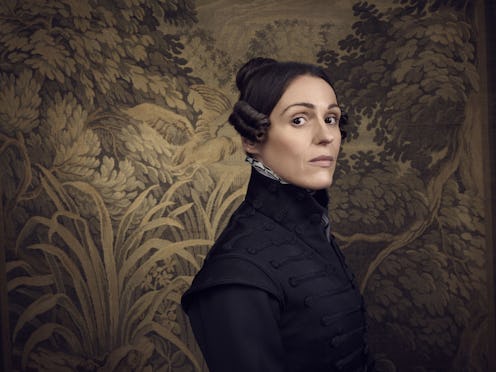Entertainment
'Gentleman Jack' Is The Lesbian 'Pride & Prejudice' Queer Women Deserve

Joining the likes of The Favourite, HBO's Gentleman Jack follows Anne Lister, a queer, 19th century English woman discontent with the sexist, anti-gay ideals laid out by society. The series is based on Lister's real diaries, which total over four million words and are largely written in code, so that Lister could discuss her lesbian exploits in great detail without judgment or retribution. But the HBO series isn't overly tawdry about this aspect of Lister's life. In many ways, it's a typical period drama not unlike Jane Austen's beloved Pride and Prejudice, which was published during the same time Lister was alive. There are fancy, curled hairdos, elaborate manors and petty gossip, polite exchanges in sitting rooms and over tea. And both are deeply feminist, groundbreaking stories — Gentleman Jack is just a more modernized, inclusive take.
Pride and Prejudice's Elizabeth Bennet is a revered feminist character because she refused to bend to society's will. She was outspoken and sure of herself, and she refused to marry for status, as was customary for the time. Instead, she wanted to find a man she genuinely loved. Anne Lister is not unlike Elizabeth. She, too, bucked convention and wanted to marry for love. But she was doing so in a far more daring way because she wanted to marry a woman — which back then, was so unheard of that it wasn't even mentioned in laws banning relationships between men. In this way, Lister's legacy builds upon Austen's (now) more conventional feminist tale.
"[Lister] had no blueprint, there were no communities. Lesbian wasn't a word then," Suranne Jones, who plays Lister in Gentleman Jack, told NPR. "She just was striking in the way that she knew exactly who she wanted to be, and pushed on and lived in that way."
In Lister's diaries, which have since been partially decoded, she wrote things like, "I love and only love the fairer sex and thus, beloved by them in turn, my heart revolts from any other love than theirs." She also refused to find a "beard" — aka a husband who would either knowingly or unknowingly let her continue her lesbian romances. She only ever pursued her honest love for women. And in 1834, she married one. As reported by The Guardian, Anne Lister and Ann Walker took communion together at the Holy Trinity church in York — which they considered to be a marriage. (It was, of course, not legally recognized at the time, but it's largely credited as the first lesbian marriage in Britain.)
In that way, Lister found her own Mr. Darcy — equally as wealthy, and just as much a real love. In the premiere episode of Gentleman Jack, Lister decides to court Walker after learning of her enormous fortune. It's not unlike any of the women or men in Pride and Prejudice (save perhaps Elizabeth) who were also trying to marry to increase their status. "The idea of pursuing Ann Walker for her money — that's what landed men did then. They tried to improve their lot by marrying well," show creator Sally Wainwright said to the New York Times.
In the series, as in real life, Lister did tend towards the masculine in terms of attitude and dress. That earned her the (rather rude) nickname Gentleman Jack, of which the series is named for. But, as Wainwright told NPR, today's audience is more accepting of the woman Lister was. "We've become a lot more articulate about the fluidity of gender and gay rights," the creator told the Los Angeles Times. "Lister was absolutely unique. She was quite open about being gay and masculine; her journals are the Rosetta Stone of lesbians."
In Gentleman Jack, it's the women who shine on screen. Much like for Elizabeth in Pride and Prejudice, the men are merely triflings — they're there but not necessarily needed. (Such was the case in The Favourite as well.) Wainwright told Collider that she doesn't intentionally write thin male characters. Rather, she thinks viewers are so used to seeing men as the center of stories, that it makes it odd to see them in the background more. "I got criticized for writing weak men [earlier in my career], and people said, 'You're making the women look stronger, by making the men weak,'" Wainwright recalled. "But the men weren't weak. They were three-dimensional characters. They just weren't the focus of the show, so people interpreted that as weak men, or weak characters, and they really weren't. They were secondary characters."
There is a lot of secondary plot in Gentleman Jack as well; it's not strictly a lesbian romance. There are storylines about coal mining, land ownership, the health perils that came with life in the 19th century. This makes it stand out from previous period dramas, which as Wainwright told Jezebel, tend to all be about women finding husbands. Not only is Gentleman Jack about a woman finding a wife, but other aspects of Lister's life, too — like how she conquered the business world at a time when it was almost exclusively dominated by men.
Jane Austen's Pride and Prejudice is certainly an important feminist story, and especially for its time. But now, over 200 years later, Gentleman Jack is taking it a step further. The show chronicles the story of a real woman who found real love without wavering in who she was or bowing to who society wanted her to be. She's a feminist hero for a more inclusive generation, and the LGBTQ community deserves this no-holds-barred retelling of her story. Lister was a barrier-breaker, and now Gentleman Jack is following suit.